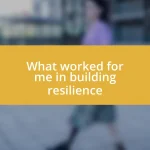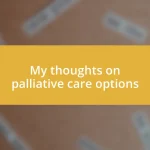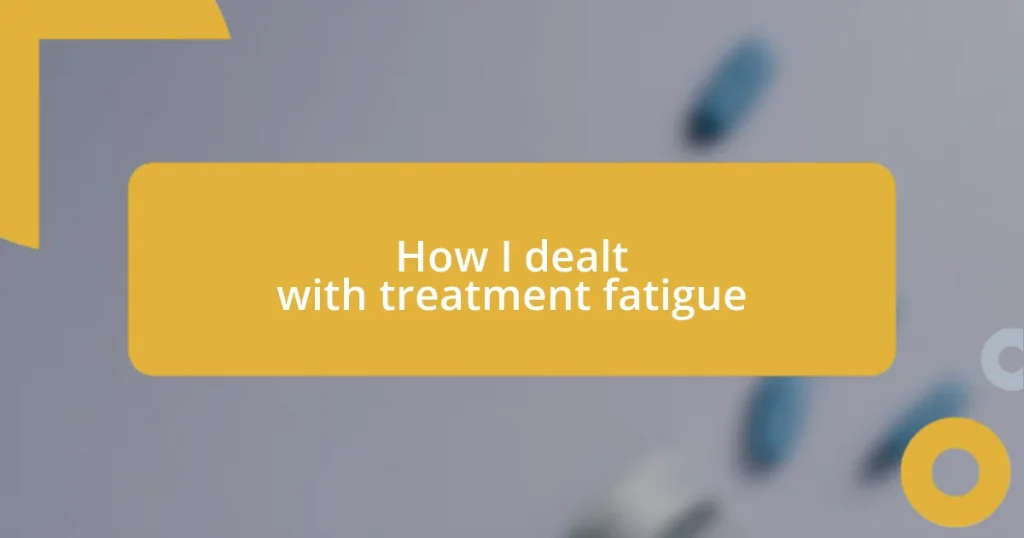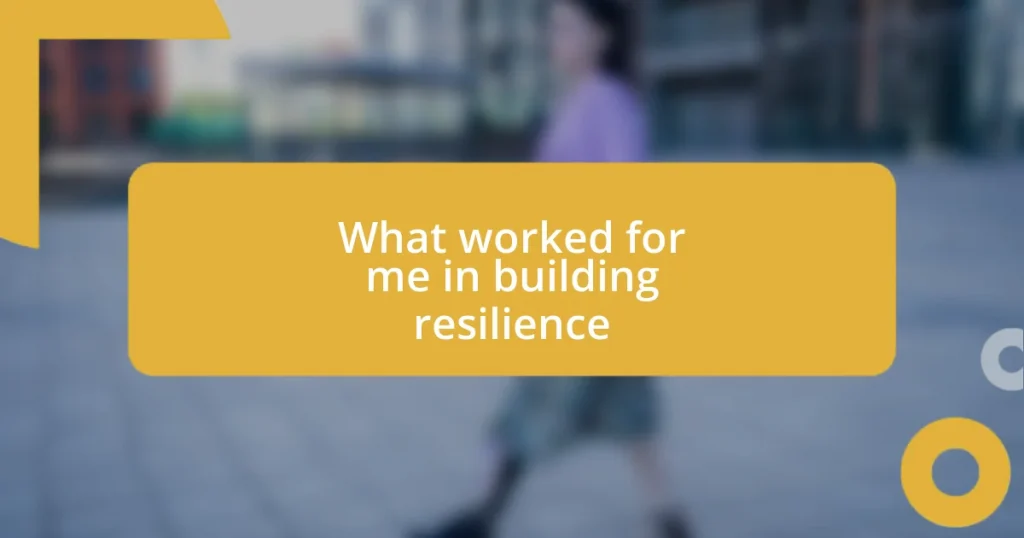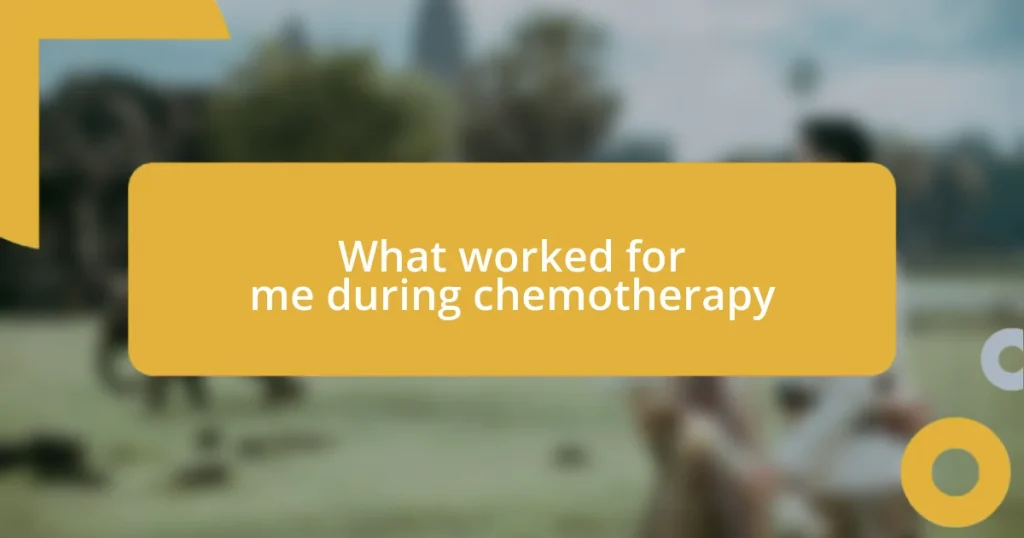Key takeaways:
- Understanding treatment fatigue requires recognizing its physical, emotional, and mental aspects, prompting individuals to acknowledge their feelings and share struggles with support systems.
- Effective strategies to manage fatigue include establishing routines for rest, delegating tasks to others, and setting boundaries to prioritize well-being.
- Engaging in self-care practices, seeking professional help, and maintaining connections with support systems are vital for finding joy and resilience amidst treatment fatigue.
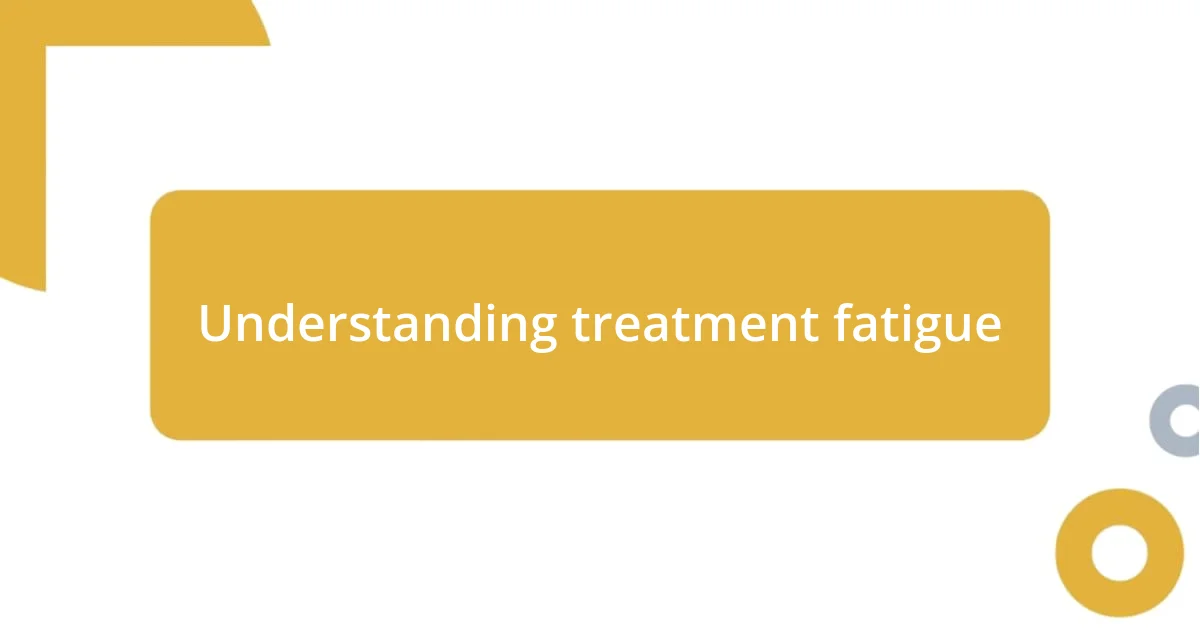
Understanding treatment fatigue
Treatment fatigue is more than just physical exhaustion; it’s an emotional and mental drain that creeps in after prolonged medical interventions. I remember hitting a wall during my therapy sessions, feeling like I was on an endless treadmill. Have you ever felt that sense of monotony, where each appointment blurred into the next, making it hard to find motivation?
It often left me questioning, “Is all of this truly worth it?” The fatigue manifests in various ways, from overwhelming weariness to a sense of hopelessness that can be paralyzing. I found myself avoiding appointments, fearing the energy it would take to just show up. There were times when I had to consciously remind myself why I started treatment in the first place, and that simple recollection sometimes reignited a flicker of hope.
Navigating through treatment fatigue also means acknowledging those feelings and talking about them. I learned that sharing my struggles with friends and support groups helped lighten the burden. Just knowing I wasn’t alone in feeling this way provided a comforting sense of solidarity that I hadn’t anticipated. Do you have a support system that helps you through tough moments? Finding people who understand this journey can often turn isolation into connection.
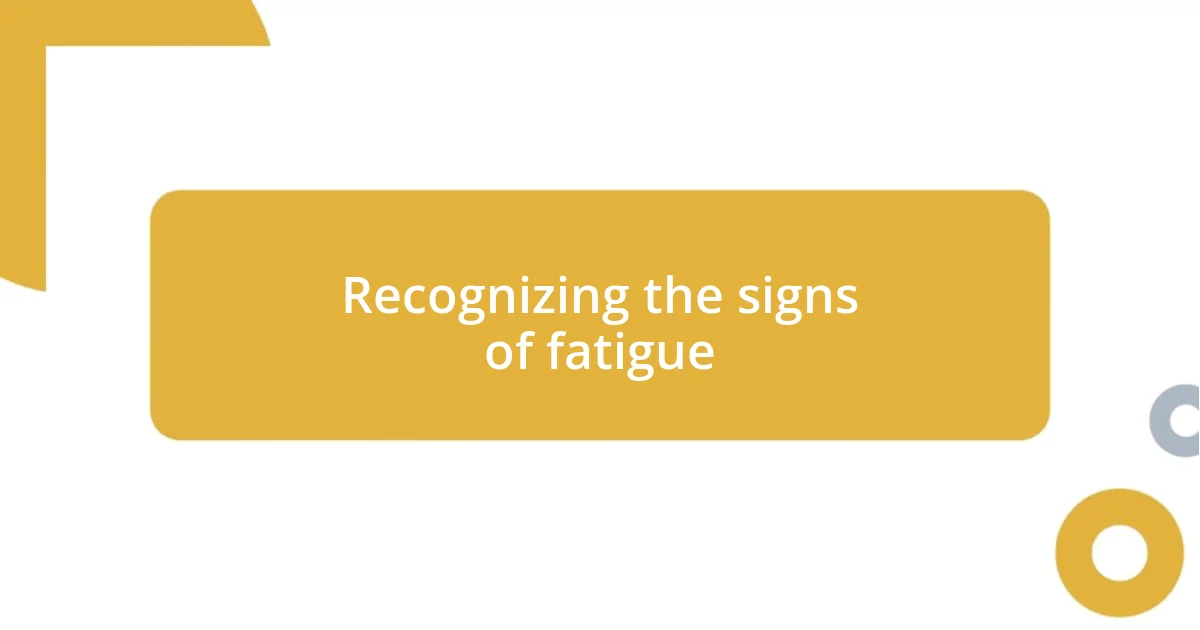
Recognizing the signs of fatigue
Recognizing the signs of fatigue was a journey in itself. I vividly remember instances where my body felt heavy, even after a good night’s sleep. It’s like my mind was willing, but my body seemed to throw a silent protest. I began to understand that fatigue isn’t just about feeling tired—it’s a complex interplay of physical, emotional, and mental exhaustion that sneaks up on you.
Here are some signs that I noticed along the way:
- Decreased Energy: Simple tasks felt daunting and required more effort than usual.
- Mood Changes: I found myself more irritable and less patient, often snapping at loved ones over trivial things.
- Focus Issues: Concentration slipped away, making it hard to engage in daily activities or even follow conversations.
- Physical Symptoms: I experienced frequent headaches and muscle tension, which I had brushed off as mere side effects of treatment.
- Social Withdrawal: I began to isolate myself from friends, avoiding outings I once enjoyed, feeling drained just thinking about interacting with others.
Recognizing these signs early on allowed me to take action before the fatigue became overwhelming. Acknowledging them felt like shedding light on a shadowy part of my experience, giving me the power to address my needs more effectively.

Strategies to manage fatigue
Managing treatment fatigue can feel overwhelming, but there are effective strategies to cope. One approach that worked for me was establishing a routine that incorporated periods of rest. I would block off specific times during the day for relaxation, whether it was enjoying a warm cup of tea while listening to music or taking a gentle walk in nature. This balance between activity and rest became a lifeline, allowing me to recharge while still engaging in things I love.
Another technique I found beneficial was to delegate tasks when possible. For instance, during particularly challenging weeks, I relied on friends and family to help with errands or household chores. I used to resist asking for help, feeling guilty or weak, but I realized that sharing the load didn’t diminish my strength. It created moments of connection and kindness, allowing me to save my energy for self-care and healing activities.
Lastly, setting boundaries became crucial. I learned to say no when I felt that my plate was too full, and this wasn’t easy. I recall a time when I declined an invitation to a gathering I usually would have attended—doing so felt liberating instead of isolating. Recognizing that it’s okay to prioritize my wellbeing made a significant difference in how I managed my fatigue, allowing me to maintain the energy I needed for essential appointments and self-care.
| Strategy | Personal Insight |
|---|---|
| Establish a Routine | I found that blocking time for relaxation made a significant difference. |
| Delegate Tasks | Asking for help changed my perspective and fostered connections. |
| Set Boundaries | Learning to say no was empowering and essential for my wellbeing. |
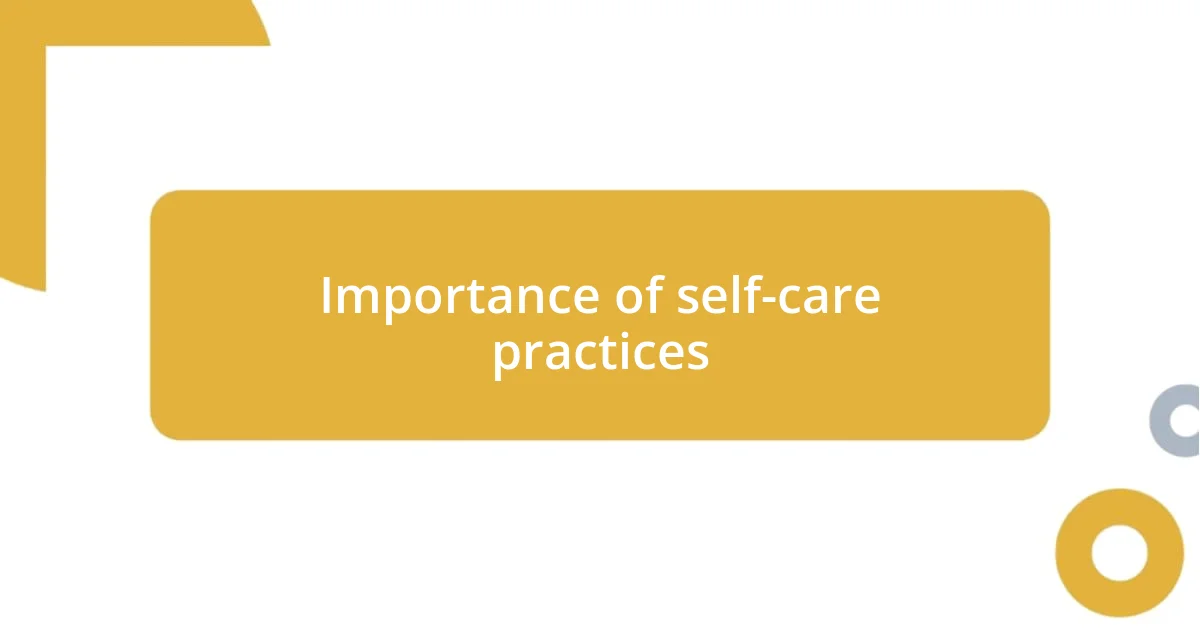
Importance of self-care practices
Taking time for self-care practices became a crucial part of my journey through treatment fatigue. I remember a particularly draining week when I decided to indulge in a warm bubble bath, surrounded by flickering candles and soothing music. It was more than just a moment of relaxation; it felt like a ritual where I could wash away the physical and emotional strain, leaving space for rejuvenation. Isn’t it fascinating how something as simple as a bath can transform your perspective?
During the tougher days, I found grounding routines invaluable. I made it a point to set aside time each morning for meditation. Committing to just ten minutes of deep breathing helped clear the mental fog, creating a sense of calm before the day unfolded. Reflecting on those moments, I often wonder: how many people overlook the power of such small practices? I’ve learned that the simplest approaches often yield profound effects, allowing us to reset and reconnect with ourselves.
Additionally, engaging in creative outlets became my sanctuary. I started journaling to express my thoughts and emotions, and honestly, some days it felt like I was laying bare my soul on the pages. Writing transformed my fatigue into understanding, helping me articulate the chaos swirling in my mind. It made me realize that self-care isn’t just about physical rest; it’s nourishing our spirit and emotions too. Why wait for burnout to spark these practices? I’ve learned that prioritizing self-care is not a luxury—it’s an essential lifeline.

Staying connected with support systems
Staying connected with my support systems became a vital part of managing my treatment fatigue. There were days when I felt like isolating myself, but I quickly discovered that reaching out instead made a remarkable difference. One late afternoon, feeling particularly drained, I decided to call a dear friend just to chat. Hearing her voice and sharing a few laughs instantly lifted my spirits; it reminded me how powerful connection can be.
I also made it a point to attend support group meetings, even when my energy levels were low. Initially, I hesitated, thinking, “Do I really want to sit around and talk about fatigue?” But once I got there, I found it incredibly refreshing to share my experiences and hear others’ stories. It created a sense of camaraderie that I didn’t realize I craved. That feeling of being understood—knowing I wasn’t alone in my struggles—was comforting, like a warm blanket on a chilly night.
Moreover, using technology to maintain connections played a unique role in my journey. Video calls became a lifeline, allowing me to engage with family who lived far away. I remember one evening, feeling particularly fatigued, when we had a virtual family dinner. Despite the distance, seeing their faces and sharing stories made me feel as if we were all together. In those moments, I understood that while fatigue can be draining, love and support can rekindle our spirits. How can we deny ourselves these moments of light? Engaging with our support systems not only brings joy but reinforces our resilience in tough times.

Seeking professional help when needed
I learned early on that seeking professional help can be a powerful ally in managing treatment fatigue. There was a time I felt overwhelmed, pushing through days like a zombie and convincing myself that I should just tough it out. After an especially tough week where self-care routines seemed to barely scratch the surface, a therapist gently reminded me that it’s perfectly acceptable to ask for guidance. That session became a turning point—I came to realize that professional support isn’t a sign of weakness; it’s a courageous step toward healing.
Sometimes, we need someone to hold up a mirror for us, reflecting what we might not see ourselves. One particular therapy session stands out. I shared my frustrations about feeling stuck in a loop of fatigue. My therapist helped me identify underlying emotions I hadn’t fully acknowledged, like fear and anxiety. By talking through these feelings, I found a sense of relief and clarity I hadn’t expected. Isn’t it surprising how a few words from someone trained to listen can evoke such profound understanding?
Exploring different support options also made a difference. Initially, I was hesitant about joining a support group, thinking it might echo the negativity I’d been feeling. But once I made the leap, I realized how valuable it was to share my experiences with others who truly understood. Talking openly about my struggles created a sense of belonging, a powerful reminder that I wasn’t alone in this fight. Could it be that reaching out for professional help not only alleviates our burdens but can also foster connections that rejuvenate our spirits?

Personal reflections on overcoming fatigue
There were moments during my treatment when fatigue felt like an unyielding cloud hanging over me. I remember lying on the couch one afternoon, convinced that my energy was permanently drained. In that moment of hopelessness, I made a commitment to myself: I would find small victories each day, whether that meant taking a short walk outside or cooking my favorite meal. Those little achievements became glimmers of light, reminding me that even the smallest efforts matter.
I also discovered the therapeutic power of journaling. On days I felt especially fatigued, I would write down my feelings, letting each word spill onto the page. One entry stands out; I wrote about a day where I had to force myself to get out of bed. As I reflected on my struggles, something shifted. I realized that acknowledging my fatigue without judgment allowed me to feel lighter. Has anyone else felt that a simple act of writing can bring such immense relief?
Then there were moments of unexpected joy that snuck up on me, like when I stumbled across a favorite song playlist. One evening, as I danced around my living room, the fatigue seemed to lift, if only for a while. It was a reminder that joy can coexist with fatigue; all we need to do is find it in the little things. How often do we forget to nurture our spirit when burdened by fatigue? In those moments, I learned that embracing joy isn’t just an escape; it’s a pathway to resilience.

